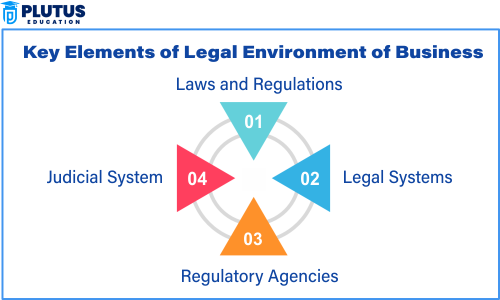The legal environment of business is the body of laws, regulations, and legal systems that govern business operations. This comprises laws on contracts, intellectual property, labor, taxation, competition, and environmental standards that businesses need to adhere to to operate legally. In this regard, the legal environment determines how businesses conduct their activities, manage risks, and interact with other stakeholders, such as customers, employees, and the government. We will discuss in this article what the legal environment is, why it is important to business operations, and how it affects it.
What is the Legal Environment of Business?
The legal environment of business is a broad term that refers to the system of laws, regulations, and rules that businesses must follow to operate legally and ethically. It includes the legal frameworks that determine how businesses interact with the government, customers, suppliers, and employees. This environment also influences the structure of industries, competition, and consumer protection laws.
In simple terms, the legal environment sets the boundaries within which businesses can operate. Businesses must ensure compliance with various legal requirements to avoid penalties, legal disputes, and reputational damage. The legal environment also provides a structure for resolving conflicts and ensuring fairness in business transactions.
Key Elements of Legal Environment of Business
The legal environment of business refers to the framework of laws and regulations that influence how businesses operate. It ensures fair competition, protects consumer and employee rights, and maintains ethical practices. Understanding these legal elements is crucial for compliance and sustainable business growth.

1. Laws and Regulations
Laws and regulations are the foundation of the legal environment of business . They govern all aspects of commercial operations, including contract enforcement, company formation, consumer protection, labor relations, taxation, and environmental compliance. Businesses must comply with statutory obligations such as the Companies Act, Contract Act, and various labor laws to avoid legal consequences. Adhering to these regulations ensures ethical conduct, protects stakeholders, and promotes trust in the business environment. Ignoring business laws and regulations can result in heavy penalties, litigation, and damage to a company’s reputation.
2. Legal Systems
The legal system refers to the structure of courts and legal principles that interpret and enforce laws. Different countries operate under different legal systems—most commonly the Common Law and Civil Law systems. The choice of legal system impacts how contracts are enforced, disputes are settled, and laws are applied to businesses. For instance, a company operating internationally must understand the legal environment in foreign markets to comply with local laws and avoid legal conflicts. A well-structured legal system offers predictability and fairness, which are vital for business confidence and strategic planning.
3. Regulatory Agencies
Regulatory agencies are government bodies responsible for monitoring and enforcing compliance with specific business laws and regulations. These include bodies like the Securities and Exchange Board of India (SEBI) for capital markets, Reserve Bank of India (RBI) for banking regulations, and the Competition Commission of India (CCI) for antitrust laws. They issue guidelines, conduct audits, and can penalize non-compliant businesses. Understanding how these regulatory authorities function is key to maintaining compliance in the legal business environment . Their role ensures market integrity, protects stakeholders, and maintains economic stability.
4. Judicial System
The judicial system plays a crucial role in resolving disputes between businesses, individuals, and the government. It interprets laws, enforces contracts, and ensures justice through a hierarchy of courts, including civil courts, high courts, and the Supreme Court. For businesses, access to an impartial and efficient judicial system provides legal certainty and a mechanism for redressal. It also upholds the rule of law, ensuring that all business entities, regardless of size, are treated equally. A reliable judicial system is an integral part of the legal framework for business , fostering investor confidence and commercial stability.
Importance of Legal Environment of Business
The legal environment of business is crucial for the smooth operation of any business. It ensures that businesses act within a legal framework, which in turn, reduces risks and enhances their reputation. Here are some key reasons why the legal environment is important for businesses:
Compliance and Risk Management
- Legal Compliance: Adhering to the laws and regulations of the country ensures that businesses do not face legal issues, penalties, or lawsuits. For example, complying with tax laws, labor laws, and environmental regulations helps businesses avoid costly legal consequences.
- Risk Mitigation: Businesses can minimize the risk of legal disputes by understanding and following the legal environment. This includes having proper contracts in place, ensuring fair treatment of employees, and protecting intellectual property.
Creating Trust and Confidence
- Customer Protection: The legal environment ensures that businesses follow ethical practices, such as providing truthful advertising and respecting consumer rights. This helps build trust with customers.
- Employee Rights: Laws related to employment and labor ensure that employees are treated fairly. This helps in attracting and retaining talent while minimizing employee disputes.
Market Competitiveness
- Fair Competition: Competition laws prevent monopolies and unfair business practices. This ensures that businesses operate in a competitive environment, which ultimately benefits consumers.
- Intellectual Property Protection: Laws regarding patents, trademarks, and copyrights protect a company’s inventions, products, and brand identity, allowing it to stay competitive.
Business Growth and Expansion
- Attracting Investment: Investors prefer businesses that operate within a stable and predictable legal environment. This gives them confidence that their investments will be protected by law.
- Global Expansion: When businesses enter international markets, understanding the legal environment of the target country is essential for smooth operations and compliance.
In essence, the legal environment of business plays a vital role in establishing a foundation for the company’s success by ensuring compliance, reducing risks, and promoting ethical business practices.
Impact of Legal Environment
The legal environment significantly impacts how businesses operate, make decisions, and navigate through challenges. It influences business strategies and shapes long-term goals. Below are some ways in which the legal environment affects businesses:
Business Operations and Strategies
- Regulatory Compliance: Companies must consider the legal requirements in their operational strategies. For example, businesses must comply with laws regarding employee safety, data protection, environmental regulations, and tax laws.
- Corporate Governance: The legal environment dictates how a company is structured, how it is managed, and how it interacts with shareholders, stakeholders, and regulators. Governance laws ensure transparency, accountability, and fairness in business operations.
Financial Implications
- Taxation Laws: The legal environment of business includes taxation policies that affect a company’s profit margins. Companies need to stay informed about corporate tax rates, VAT, and other applicable taxes to optimize their financial strategies.
- Investment Laws: The laws surrounding investments and capital markets influence a business’s ability to raise funds through equity, debt, or other financing mechanisms.
Legal Risks and Liabilities
- Litigation: Businesses operating in an unclear or restrictive legal environment may face lawsuits. For example, companies that fail to comply with environmental or consumer protection laws may be sued for damages.
- Liabilities: Legal regulations related to product safety, labor laws, and contracts can expose businesses to liabilities. If a company fails to meet legal standards, it may face penalties, fines, or compensation claims.
Consumer Behavior
- Consumer Protection Laws: Laws designed to protect consumers directly influence how businesses market their products, deliver services, and handle customer complaints. For instance, businesses must adhere to truth-in-advertising laws to avoid misleading customers.
- Privacy and Data Protection: Legal regulations surrounding consumer data, such as the GDPR (General Data Protection Regulation) in the European Union, impact how businesses collect, store, and use customer data.
In summary, the legal environment has a direct impact on various aspects of business operations. It influences business strategies, financial decisions, risk management, and the relationships businesses have with consumers, employees, and investors.
Legal Environment of Business FAQs
1. What is the legal environment of business?
It refers to laws, regulations, and legal systems that govern business operations. It includes contract law, labor law, tax law, and more.
2. Why is the legal environment important for businesses?
It ensures legal compliance, reduces risk, promotes ethical practices, and builds trust with customers and stakeholders.
3. What are the main elements of the legal environment?
Key elements include laws related to business formation, contracts, labor, taxation, intellectual property, and consumer protection.
4. How does government policy affect the legal environment?
Government policies shape laws and regulations that impact business decisions, operations, and overall economic environment.
5. What happens if a business violates legal regulations?
Consequences include penalties, fines, lawsuits, license cancellation, and damage to reputation or business closure.


